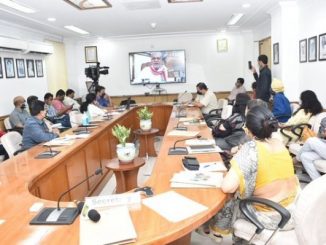
June 01: International experts in a convention organized on 29 May by NITI Aayog endorsed efforts to significantly boost agroecological and natural farming approaches in India.
Speaking to an audience of senior international and national experts and policymakers, Minister of Agriculture Shri Narendra Singh Tomar stated, “Natural farming is our indigenous system based on cow dung and urine, biomass, mulch, and soil aeration. In the next five years, we intend to reach 20 lakh hectares in any form of organic farming, including natural farming, of which 12 lakh hectares are under BPKP [Bharatiya Prakritik Krishi Paddhati Programme].’
He further noted that the Paramparagat Krishi Vikas Yojana launched in 2015 to promote organic farming among small and marginal farmers has in the last four years covered 7 lakh hectares and 8 lakh, farmers. He pointed out that Andhra Pradesh, Karnataka, Himachal Pradesh, and Kerala have taken up natural farming on a large scale. Andhra Pradesh alone has brought 2 lakh hectares under natural farming under this scheme. He concluded by highlighting that the need of the hour, in light of the COVID-19 pandemic, was to have ‘food free from chemical fertilizers and pesticides’, while not ignoring the need to feed and nourish the country.
Setting the scene for the online High-level Roundtable, the first of its kind in India, NITI Aayog Vice-Chairman Dr. Rajiv Kumar established a high bar for the transformation and renewal of agriculture in India when he asked whether agroecology and natural farming can ‘avoid excessive and wasteful use of water, prevent farmer indebtedness, contribute to mitigating greenhouse gases while supporting farmer incomes and their ability to adapt to climate change’.
International experts from the US, UK, Netherlands, CGIAR, Australia, Germany, and of UN acknowledged India’s pioneering leadership in the arena of agroecology—the science of applying ecology to agriculture for sustainable outcomes that are more resilient to climate shocks such as droughts or flooding and pest attacks but are still productive and support farmer’s livelihoods—and especially natural farming, which is a form of agroecology. Natural farming avoids the use of synthetic fertilizers and pesticides while focusing on reviving the beneficial soil organisms that contribute to fertility and good nutrition of the plants. Experts explained that well-nourished plants lead to well-nourished human beings.
The gathered experts provided evidence from the latest studies, cutting-edge research, and science as well as practical experience from economics, finance, and markets. The overwhelming conclusion was to support the Minister’s conclusion that natural farming and other agroecological approaches, such as organic agriculture, have great promise for a renaissance of Indian agriculture so that farming is not just productive but truly regenerative and sustainable.
Experts concluded that it would be a mistake to view natural farming as a step backward to the farming techniques of our forefathers, but rather, as the high-level panel of experts report on Agroecology to the Committee on Food Security of FAO so clearly demonstrated, it is based on the cutting-edge science of the future that recognizes the need for systemic approaches to dealing with complex adaptive systems that are the basis of a healthy natural world. Working with nature, understanding how to do so will help us ‘build back better’ as one expert noted.
Others noted the huge interest, to the scale of hundreds of billions of dollars, in investing in natural farming and agroecology as they were systems of the future. Prof. Ramesh Chand, Member (Agriculture) of NITI Aayog, called for more research to ensure that natural farming could truly live up to its expectations. The need for innovation, science, and technology was endorsed by experts who noted the importance of regenerating soils and building on biodiversity as two key elements, along with the use of natural inputs readily available to farmers in this knowledge-intensive approach.
Commenting on the presentations made by assembled experts, Principal Scientific Adviser to the Government of India Prof. K. Vijayraghavan remarked, ‘We are running behind yields at the cost of diversity and nutrition. To protect our planet there is a need for change in our attitude towards the use of chemical fertilizers and pesticides. Technology can help in changing the way we farm and will enable the poorest of the poor to enhance their nutrition status and livelihoods.
Sorce: PIB
Disclaimer: We donot claim that the images used as part of the news published are always owned by us. From time to time, we use images sourced as part of news or any related images or representations. Kindly take a look at our image usage policy on how we select the image that are used as part of the news.


